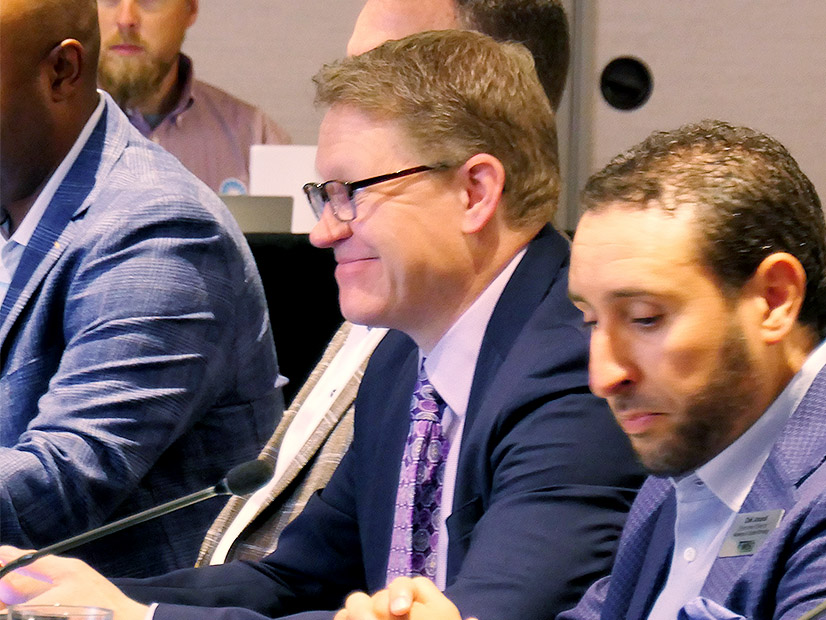
INDIANAPOLIS — MISO’s quarterly public meetup with its board of directors put on display the unrelenting rift between the RTO’s planners and the Independent Market Monitor over MISO’s $21 billion in upcoming long-range transmission planning.
At a Sept. 17 Markets Committee meeting of the MISO Board of Directors, MISO IMM David Patton encouraged a recess on the proposed $21 billion second long-range transmission plan (LRTP) portfolio until MISO agrees to rework its 20-year view of its system and the benefit estimation of the transmission.
Patton repeated concerns he raised earlier at a stakeholder workshop on MISO’s second LRTP portfolio, which MISO hopes to advance for board approval by the end of 2024. (See MISO Says 2nd Long-range Tx Plan to Cost $21B, Deliver Double in Benefits.)
“We should pause this process and get to the bottom of this before we allow it to move on,” Patton told board members. “The problem is we don’t have a credible, ‘what-will-the-world-look-like’ scenario if we don’t build this transmission.”
Senior Vice President of Planning and Operations Jennifer Curran said MISO believes it has devised a valuable portfolio and stands by its conservative, 1.9:1 benefit-to-cost estimate.
“I think we have a different philosophy on benefits that leads to a fundamental disagreement,” she told the board.
“We can’t perfectly predict the future. But through the use of scenarios, we can develop the most robust portfolio using the modeling we have available today,” Vice President of System Planning Aubrey Johnson said.
Johnson said the LRTP can be interpreted as “skating to where the puck will be.” He said recent load growth shows MISO’s top-end, most radical planning scenario is likely, when some stakeholders thought it outlandish five years ago.
Johnson said even scaling back MISO’s decarbonization benefit for areas of the footprint where the value of decarbonization isn’t openly acknowledged, the portfolio still would have 1.3:1 benefit-cost ratio.
Multiple stakeholders urged MISO not to entertain the IMM’s request for an assumptions and benefits rework.
ITC’s Brian Drumm said MISO leadership should reject the Monitor’s calls to “develop and test against an alternate reality” regarding LRTP transmission planning.
Drumm said it’s “irresponsible and dangerous” for Patton to assume MISO won’t experience a major load shed event simply because it never has or assume members will make plans independently to dodge one.
“Stakeholders have chosen to solve the reliability imperative through long-range planning and particularly” the second LRTP portfolio, Drumm argued. “The IMM’s request is inappropriate because MISO’s role is to plan regional transmission, not to serve as an integrated resource planner.”
Drumm added that the industry is aware that significant loss of load events will occur again and become more pronounced by extreme weather. He said avoiding just one widespread load shedding event can more than cover the $21 billion price tag of LRTP II.
The Union of Concerned Scientists’ Sam Gomberg said MISO isn’t going far enough in incorporating climate risk assessments in long-range transmission planning. He said the RTO should anticipate changing weather patterns to inform system planning so it doesn’t end up trying to solve the challenges of extreme weather on the fly in the control room.
Gomberg also said MISO is correct to value decarbonization in transmission planning. He said Patton’s argument that federal production tax credits already fully value decarbonization and MISO’s benefit metric is redundant “borders on absurd” and gives too much credit to Congress to objectively put a price on the social cost of carbon.
MISO Director Phyllis Currie asked if the RTO has a stance on planning for increased climate impacts on the system.
“I think our primary objective is to reflect our members’ objectives. We really follow the lead of our members [rather] than taking an independent view of climate change,” Curran said. However, Curran added that from an operations standpoint, MISO uses analytics and machine learning to forecast weather events that historically haven’t occurred.
“David Patton consistently misunderstands the benefits of regional backbone lines … [and] doesn’t like long-term scenario-based planning,” Sustainable FERC Project attorney Lauren Azar argued to board members. Azar said the IMM appears to want MISO to “go backwards” into the “balkanized system” that existed before the RTO’s creation.
Azar rhetorically asked board members to place a monetary value on the 210 lives lost when the lights went out on Texas residents during Winter Storm Uri.
Azar said the IMM should stick to its original purpose of “mainly markets” and advised MISO not to pay for the IMM’s opinions on transmission planning through its IMM budget.
The MISO IMM has made some stakeholders uneasy with his interest in MISO’s long-range transmission planning and public criticism of the 20-year fleet and benefit estimates MISO uses. Since last year, some have said the IMM oversteps his role.
MISO’s board of directors has included a $250,000 allowance in the Monitor’s $10 million budget next year to “monitor ratings and identify transmission withholding and compliance” associated with ambient adjusted line ratings requirements it will roll out under FERC Order 881. The line item and data collection of transmission data caused consternation among MISO transmission owners.
MISO staff will be “actively discussing what data” transmission owners must provide, MISO Director Trip Doggett said.



